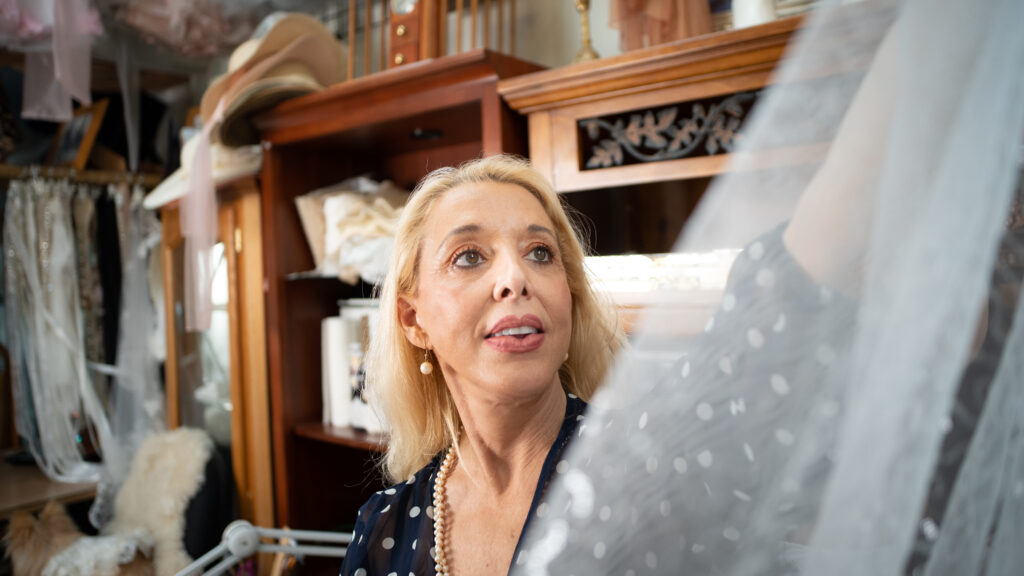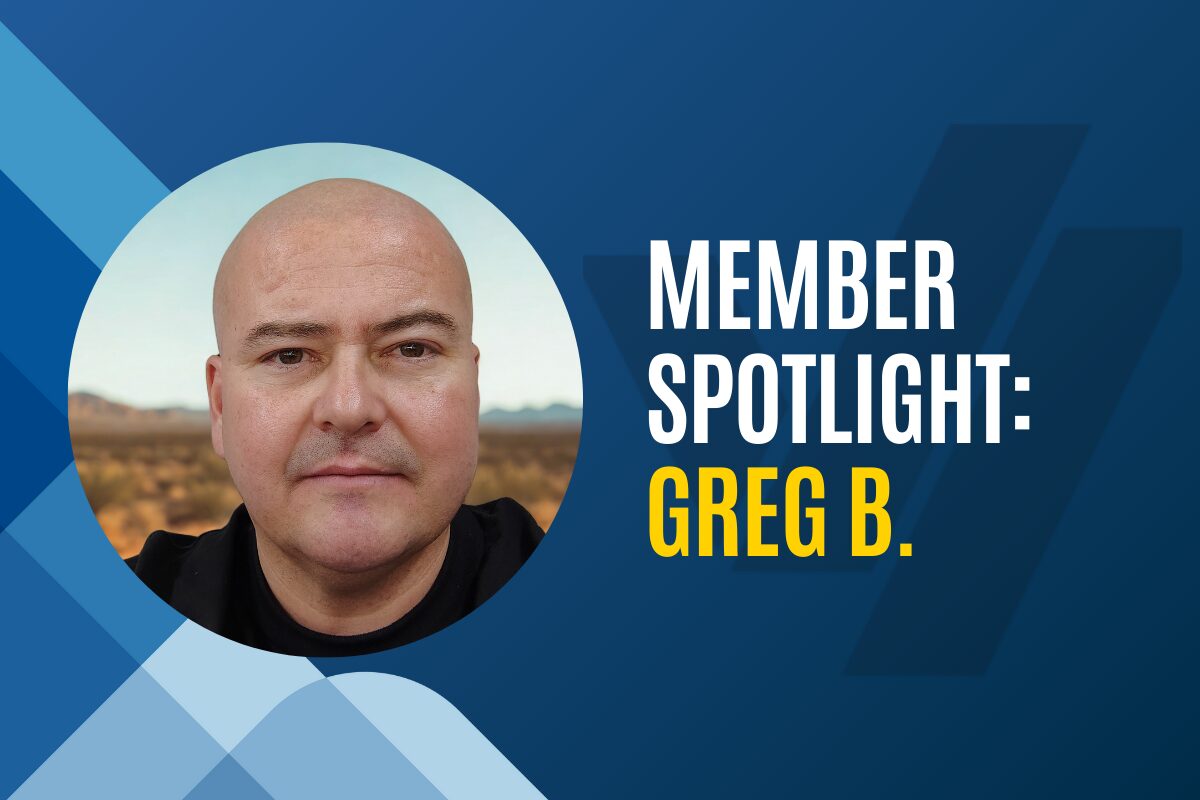It was the year 2000, the turn of the millennium, when Joyce Feickert and Marv Kirchler finally bought the farm.
More specifically, the couple purchased a 1920s farmhouse to renovate into the new home of Hem & Her Bridal Design Studio, the business they’ve run together for more than 20 years.
Over the next two decades, Joyce would become a highly sought-after tailor and clothing designer in Tucson. Whether it was a prom, quinceañera, or wedding, Joyce became known for creating perfect alterations that maintained the original spirit of the outfit, while transforming it into something new.
“The difference between us and a normal tailor is that we’re a design business as well,” Marv says. “Joyce redesigns every dress to fit the needs of each client. In that way, it’s a very client-focused business.”
Hem & Her is built on repeat happy customers. Often, Joyce designed dresses for entire families, for multiple events throughout the family’s life, the relationships lasting for years.
“We don’t need to advertise,” Marv says. “Because once we get someone in the door, we can count on repeat business.”

Back to Basics
Before the farmhouse, Joyce felt like she needed a change. After 15 years of running a tailoring business near the busy Campbell and Grant area, the business had grown. At the time, Joyce managed a sizable group of employees.
Despite the growth, or perhaps because of the growth, Joyce was feeling overwhelmed, like something was missing. She wanted to simplify the business and be able to focus more on her own design work rather than moving product out the door.
“I wanted to focus on quality, not quantity,” Joyce says. “You can’t give someone your brush and expect them to paint the same picture as you would have.”
The farmhouse, tucked behind Stone Ave south of the Tucson Mall, provided a sense of peace and relief compared to the previous bustling location. “It has a better energy,” she says. “It’s located off the street so it’s good for a nervous bride to have more of a quiet place.”
The new space was ideally suited for such a multifaceted business as Hem & Her, with each room set up for a specific purpose. The atmosphere of the farmhouse also added a homey element to the enterprise, a feeling both Joyce and Marv intentionally set out to create.
Seeking Out Sunshine
In addition to serving the business’ purpose, the farmhouse also allowed Joyce to tap into her childhood experiences of growing up on a farm in South Dakota. It was there, at age 4, when Joyce developed a love for sewing.
“I used to sneak off to my mother’s sewing room to play with the sewing machine,” she says. “When she caught me, I thought I was going to be in trouble. But my mother made a deal that as long as I finished what I started, I had free reign over all the fabric and materials. I was like a kid in a candy store.”
From that moment, there was no stopping Joyce and her desire to create beautiful clothing designs. But it wasn’t until a chance encounter a few years later when Joyce’s future in Tucson would manifest.
One winter evening in 1983, it was eight below zero in South Dakota and Joyce was miserably cold while attending a house party. She spotted a woman with “beautiful skin” across the room and began chatting with her.
Not used to seeing such a complexion in the nearly sunless state, Joyce asked the woman about her tanning routine. The woman laughed and answered that she was from Tucson, where it was sunny all year long.
This conversation sparked Joyce’s curiosity. Tucson sounded like a dream. From that moment, Joyce was determined to seek out the land of permanent sunshine.
“I drove as far south as I could,” she says. “I was willing to do whatever I needed to in order to make this work.”
Windy City Meets Old Pueblo
Around the same time Joyce was finding her direction, Marv arrived from Chicago not knowing anyone and having little direction himself.
Marv worked in the billboard business and had recently accepted a transfer to Tucson, not knowing what to expect. He had few business contacts, and needed to make some friends quickly. That included finding a good accountant.
His search for a business network led him to David Cutler, an accountant who would years later found Felicia’s Farm. Marv’s wandering in the Old Pueblo led to a fateful encounter with Joyce. She was instantly smitten by the mysterious man from Chicago, despite her father’s warning to “be careful with those big city boys.”
Throwing her father’s caution to the wind, Joyce became close friends with Marv for 15 years before the relationship grew into something deeper. The couple eventually married and decided to go into business together.
Feeding a Purpose
In 2009, David Cutler wanted to honor the memory of his beloved late wife, Felicia. Among a community of do-gooders, Felicia went above and beyond. Her reputation for kindness and charity was legendary, which made her loss that much more palpable.
David opened Felicia’s Farm a year later, with four acres of farmland across the street from the Jewish Community Center. He donated all produce from the farm to local nonprofits to feed the homeless and food insecure. At its height before the pandemic, the farm gave away 700 pounds of produce and 130 dozen eggs per week to local aid organizations such as Casa Maria soup kitchen, Lend-A-Hand, and South Tucson Food Bank.
This mission of selfless giving was David’s attempt to capture Felicia’s spirit through action. The farm also gave Marv and Joyce the chance to become more involved with their community. Marv later became board president when the pandemic approached, as the farm found itself losing volunteers because of social distancing measures.
“I told him that I’m the only person who would be able to do this on such a limited budget,” Marv says. “That way, we could save money and invest it back into the farm.”

Obstacles and Opportunities
By now, we’re used to hearing the prototypical pandemic story of a business humming along until…2020 happened.
With the number of events greatly reduced, business slowed for Hem & Her, “drastically impacting the volume of the business.” Along with the slump in business, the pandemic impacted supply chains worldwide, leading to mass shortages of materials, such as fabric. Fortunately, Joyce had a decent stockpile that allowed her to outlast the pandemic.
While Hem & Her wasn’t spared from the wreckage wrought by COVID-19, the experience of 2020 held a silver lining for Joyce and Marv. With the relative quiet, Joyce was able to tackle personal projects long dormant. In a way, the slowdown of 2020 became a blessing.
”I was saving these projects for a rainy day and that rainy day had finally come,” Joyce says. “So I took advantage of the downtime.”
Joyce found another blessing in Tucson’s small business community, whom she credits for providing support throughout that difficult time. Joyce says that as the economy opens, more community members have come to visit, making things seem more like normal.





